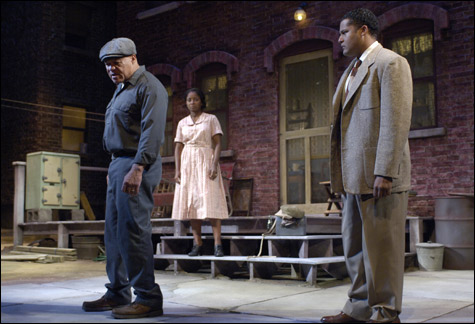
FENCES It’s the combination of the mundane and the miraculous that makes August Wilson’s play not only hard-hitting but transcendent. |
August Wilson pioneered a magical realism all his own. In the late dramatist's cycle of 10 plays chronicling decade by decade the African-American experience of the 20th century, the kitchen sink is oftener than not limned by a halo of the supernatural. And FENCES, among the most traditional yet powerful of the playwright's works, is no exception. Set on a scruffy patch of yard off a Pittsburgh alley in 1957, Wilson's first Pulitzer winner centers on an embittered titan of a garbage collector who claims to have wrestled down the Devil and also includes a mentally damaged character whose perceived connections to Heaven turn out to be quite genuine. As in Wilson's other finest works, it's this combination of the mundane and the miraculous ? interwoven in a rich tapestry of black speech that draws on the church, the street, and the blues ? that makes the play not only hard-hitting but transcendent. And slammed here by the bat of the Huntington Theatre Company (at the Boston University Theatre through October 11), the baseball-centric drama soars.
The Huntington early on became a way station for Wilson's plays as they traveled toward Broadway, their author, with his familiar cap and cigarette, rewriting in restaurants that included Ann's Cafeteria (now Betty's Wok and Noodle) near the BU Theatre. Fences made its pilgrimage before the Huntington got in on the act, but with this production the Boston troupe mounts its ninth play of Wilson's sweeping cycle. Frequent Wilson collaborator Kenny Leon is at the helm, with Wilson vet John Beasley filling James Earl Jones's shoes if not quite supplying his thunder as Herculean hauler of refuse Troy Maxson, and Crystal Fox turning in a subtly devastating performance as Rose, the wife in whose compassionate embrace Troy nightly tries "to blast a hole into forever."

There are echoes of Shakespeare and Arthur Miller in Wilson's story of a tough father both thwarting and shaping his sons at a time when the winds of social change were just starting to blow. A sharecropper's son who weathered the black diaspora north, a term in prison, and the hardening disappointment of having been a gifted Negro League ballplayer before Jackie Robinson broke the color barrier, Troy disparages his jazz-musician son from an earlier marriage and squelches any chance his son with Rose might have for a football scholarship that he assumes will lead, like his own sports prowess, nowhere. Troy's motives are both protective and mean-spirited, spurred by dueling fears that the son too will strike out against the white Establishment and that he'll outstrip his galvanic old man. And Beasley (though he flubs a few lines) captures both the brute, self-forged morality of Troy and the frisky raconteur with "some Uncle Remus" in him.
The Huntington production unfolds on Marjorie Bradley Kellogg's impressively rundown city block of a set, which is lit by Ann Wrightson to a bleak loveliness. Leon understands Fences' interplay of joyousness and mournfulness and skillfully orchestrates its now simmering, now eruptive tensions and its easy musicality. The supporting players, uniformly fine, include Bill Nunn's big, shuffling baby of a Gabriel, Troy's brother, whose World War II brain injury financed the Maxson home.
Leon underplays the fantastical final moments of the drama, when Gabe, who has been toting a dysfunctional trumpet, tries to blow his brother through the pearly gates. When a frustrated Gabe finally lets loose his own human instrument, the stage is washed in radiance as, in Wilson's words, here not made literal, "the gates of Heaven stand open as wide as God's closet." If such marvelous apertures do occur, one almost certainly did when 60-year-old Wilson, his monumental life's work only just completed, crossed over.
What THE SAVANNAH DISPUTATION needs to give it real edge is an Avon Lady visit by Christopher Hitchens. As written, Evan Smith's amusing little comedy, in its Boston debut by SpeakEasy Stage Company (at the Calderwood Pavilion through October 17), is a smackdown between true if kneejerk believers: a couple of elderly Irish Catholic sisters aptly named Mary and Margaret, whose belief is deep if also rote, and the fundamentalist Christian cheerleader who shows up on their doorstep bent on conversion. Given that this amateur dogmatist, to whom every word in the Bible is literal, fancies herself conducting "a ministry," it's probably fair that Mary, the grumpier of the spinsters, decides to trick her into a return visit, also inviting the parish priest without telling him his mission is to "crush" the perky proselytizer. The ancient Romans had to unleash lions on the Christians; Smith needs only to set them loose against one another.
The playwright, a Savannah native who was raised Catholic, intends this work to mirror the rigidly polarized and oft-uninformed American political debate of which Bible thumping is but a part. I'm not sure it makes it out of its own tight corner, but Smith's sentimental sit-com dressed up as theological disputation is nonetheless extremely funny, and the blithe narrowness of both sides is exposed in Paul Daigneault's hilarious SpeakEasy production, which retains its characters' humanity even when letting the battle go physical as the sibs wrestle over whether to trash their innumerable Catholic tchotchkes. It helps that both Paula Plum's Doubting Thomasina and Timothy Crowe's pained intellectual of a priest are subtly played, leaving the real cat fight to Nancy E. Carroll's scathing crank, who defends her meanness as if it were the Grail, and Carolyn Charpie's fetching airhead of a door-to-door evangelical (mysteriously, the only character with a drawl).